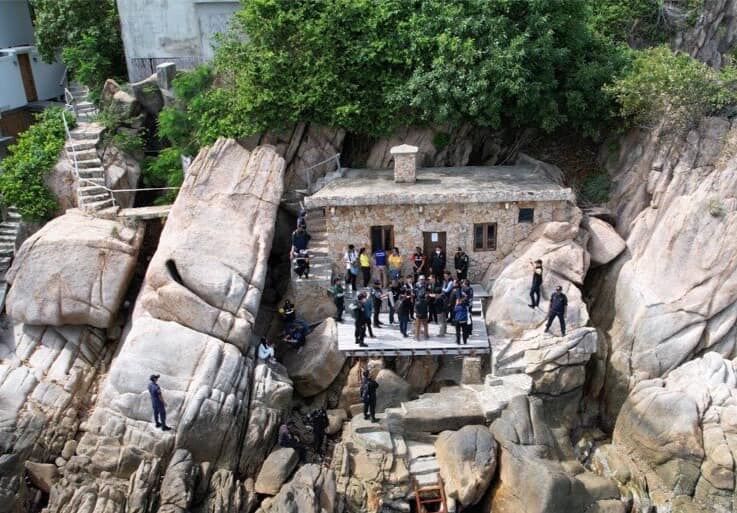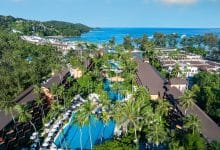Koh Tao beach resort faces hefty fines and restoration orders on illegal structures and breaches

The Department of Marine and Coastal Resources (DMCR) and related agencies investigated a Koh Tao beach resort following viral social media images, consequently presenting four charges and ordering a restoration to its former state. The establishment in question, located on the popular Koh Tao island in Surat Thani province, a touristic gem often referred to as Turtle Island, came under scrutiny yesterday.
Assigned by DMCR Minister Warawut Silpa-archa, Dr Yutthaphon Ankinan, the minister’s advisor, inspected the resort alongside related personnel from DMCR and other involved agencies. They found that the entire island falls under royal possessions, overseen by the Department of Treasury.
The on-site structures were owned by Cape Shark Pool Villa Co. Ltd., with no construction permit. There were no attempts to rent the land from the treasury, nor did they have permission to erect any buildings. There had not been any announcements or permits of any nature. Local officers under the Building Control Act, B.E. 2522, had banned anyone from using or entering any part of the buildings since June 22.
Yutthaphon further revealed that pipes were installed in the guest housing area to dispose of wastewater directly into the sea, a public water source, with no government standard treatment. Officers notified Sunisa Lapport, the resort owner, of the violations committed by Cape Shark Pool Villa, branding their actions as unlawful, reported KhaoSod.
The accusations, listed under four varying laws were as follows:
1. Under the Royal Property Act, B.E. 2562, section: Occupancy or possession in whole or part without lawful right or any act causing disturbance to the usual utilisation of royal property, or causing damage or deterioration to the royal property. Possible punishment: Imprisonment for up to five years, a fine of up to 100,000 baht, or both, according to Section 45.
2. The Building Control Act, B.E. 2522 & amendments, where construction, alteration, or moving of structures without proper permission from local officers, or not reporting to local officers and following Section 39 as per Section 21, is in association with Section 65.
3. Under the Hotel Act, B.E. 2547 & amendments, it is illegal to operate a hotel business without approval from a registrar, contrary to Section 15 in connection with Section 59.
4. The National Environmental Quality Promotion and Maintenance Act, B.E. 2535, prohibits contravention or non-compliance with regulations established in the Ministerial regulations made under Section 44 or as stated in the Minister’s announcement under Section 45. This comes with a recommended one-year prison sentence or a fine of up to 100,000 baht, or both.
Dr Yutthaphon further confirmed that Sunisa cooperated excellently, acknowledging all the accusations, claiming they occurred due to unawareness of the laws. Now willing to demolish the structures and return the area to its original state, the accused resort owner has pledged to take full responsibility for the restoration. All allegations have been handed over to the Koh Pha Ngan Police Station for further legal proceedings.
Latest Thailand News
Follow The Thaiger on Google News:


























